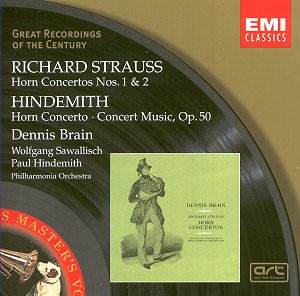Dennis Brain was already a performer of enormous celebrity
when he died in a car crash late one night in the summer of 1957, while
making his way back from triumphant appearances at the Edinburgh Festival.
These recordings, made in the latter part of the previous year, offer
abundant evidence of his exceptional gifts, and approach the status
of sacred relics for modern horn players. Itís wonderful to have them
for the first time in these excellent CD transfers.
Richard Straussís father was a distinguished horn player,
and these two fine concertos come from opposite ends of his career;
the first is an apprentice work, albeit a most accomplished one, from
his late teens, while the second is from the flowering of his old age
that included such works as the Oboe Concerto and the Four Last Songs.
The Hindemith works are equally interesting; the Horn Concerto reminded
me very much of the driving rhythms and exotic textures of the Symphonic
Metamorphoses. I was grateful that the booklet quoted the little
poem that Hindemith wrote which relates to both the mood and rhythms
of the final section of the concerto. I know at least one horn player
who believed the composer wished the poem to be actually declaimed by
the soloist, but Lyndon Jenkins, the booklet author, assures us that
this is not the case, and that it was simply intended as a pointer to
the mood and atmosphere of the music.
The disc concludes with a recording of the Concert
Music of 1930. Not a horn solo piece (though Brain is probably playing
in the orchestra), but nevertheless a major masterpiece, reminiscent
in many places of the visionary qualities of Mathis der Maler. Itís
also a work which reminds us what a hugely influential figure Hindemith
was in the years between the wars. He represented a real "third
way" between the neo-classicism of Stravinsky and the serialism
of Schoenberg; there is a striking fugue subject which is the progenitor
of the one in the finale of Waltonís Symphony no.1, for example.
The Strauss 2nd Horn Concerto is a glorious
work, and this recording shows Brainís qualities at their very best
Ė flawless technique, smooth yet open horn tone, and natural, supple
musicianship in every phrase. The orchestration has some memorable touches,
too, most strikingly the great moment when, at the climax of the finale,
the horns in the orchestra join forces with the soloist for a riotous
version of the main theme.
A pity that EMI have got their indexing wrong; there
are actually 11 tracks on the CD, though the cover and notes think there
are 13, which is quite unnecessarily confusing.
One of the greatest instrumentalists of the 20th
century in some of its juiciest music Ė itís a disc you canít really
afford to miss.
Gwyn Parry-Jones


